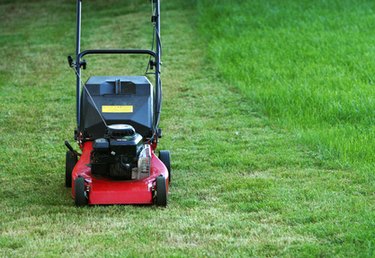Things You'll Need
Wrench, 7/16- or 1/2-inch head
Flywheel clutch tool
Flywheel holder
Flywheel puller
Pliers
Mill file
Replacement shear key
Hammer

If you run over a rock, hard branch or other object with your lawn mower and the mower doesn't crank no matter how many times you try, don't panic. Most lawn mowers use Briggs and Stratton engines--low-horsepower engines with easily-replaceable parts. Most likely you will have to replace the shear pin. Paul Dempsey's book "How to Repair Briggs and Stratton Engines" states that aluminum keys are made to shear intentionally and prevent the damage to the flywheel or crankshaft.
Step 1
Disconnect the spark plug leads and remove the engine shroud with the wrench to expose the inner mechanisms of the mower.
Video of the Day
Step 2
Using the flywheel clutch tool and holder, disengage the flywheel brake and clutch if the flywheel is equipped with them. Hold the flywheel stationary and use the wrench to remove the clutch.
Step 3
Place the flywheel puller on the wheel so that its bolts are aligned with the holes. Then, tighten the nuts to gently pull the flywheel free, exposing the shear pin and crankshaft.
Step 4
Draw the shear pin free with the pliers by using the surface of the crankshaft as a fulcrum.
Step 5
Look at the crankshaft and flywheel for any nicks or ridges. Sand the ridges with the mill file as smooth as possible, and remove any filings from the keyway.
Step 6
Slide the new shear pin into the keyway and tap it gently into place with the hammer.
Step 7
Look through the flywheel's keyway and align it with the key. Slide the flywheel onto the key and replace the flywheel bolts, clutch and brakes. Put the shroud back on the engine and reconnect the spark plug leads.
Tip
Twist the flywheel in both directions before replacing the covers; if you feel any give, the new key wasn't inserted properly.
Warning
The Briggs and Stratton website warns against striking the flywheel when removing it. Even a small deformation can cause catastrophic engine failure.
Video of the Day